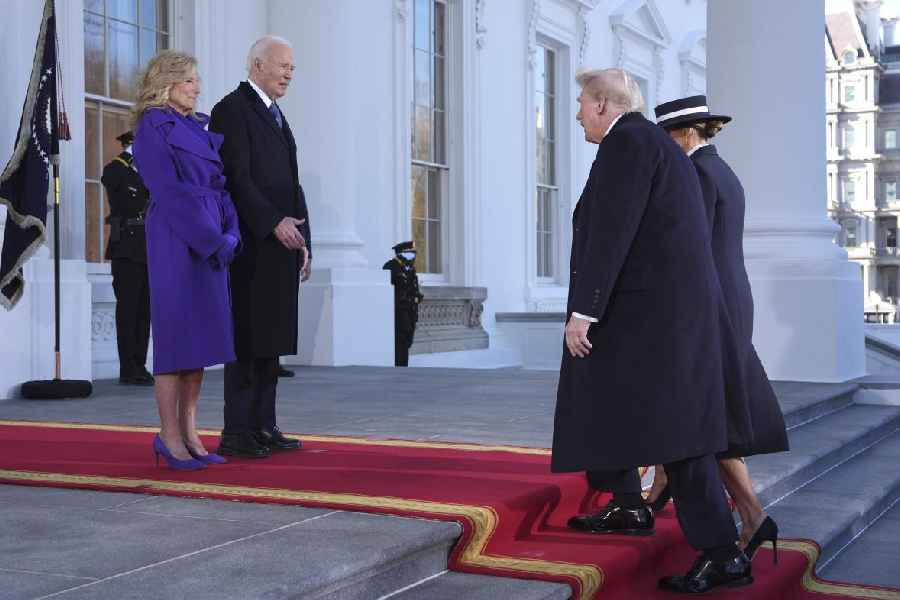It is entirely possible that future historians will see the abrupt fall of the al-Assad regime after five decades in power as the inescapable continuation of the Arab Spring. The turbulence that began in 2010 in Tunisia and had a cascading effect on the entire region, leading to the fall of entrenched dictatorships in Egypt, Libya and Yemen, also triggered a vicious civil war in Syria in 2011. The war to dislodge the regime of Bashar al-Assad didn’t produce immediate results but led to the exodus of nearly seven million Syrians to neighbouring states and even to Europe. It is suggested that nearly half a million people were killed in the conflict. The rebellion was put down by the Assad regime with a very heavy hand with active help from Russia, Iran and Hezbollah, Iran’s proxy in Lebanon.
Yet, regardless of the long view that posterity naturally accords, it would not be an overstatement to suggest that hardly anyone had any premonition of the dramatic developments that would lead to a regime change in just five days. The regime of the second Assad was undeniably vulnerable after the bloody civil war and disproportionately dependent on its Russian and Iranian allies, but there was no anticipation of either the extent of its fragility or the ability of the hitherto obscure Hayat Tahrir al-Sham, led by al Qaida alumnus and wanted terrorist, Abu Mohammad al-Jolani (his real name is Ahmed al-Sharaa), to walk into Damascus unopposed. As David McCloskey, a former CIA operative and the author of the best-selling Damascus Station, crowed in The Times: “The House of Assad has fallen, and the spies did not see it coming… The speedy fall was unknowable, the sort of complex, networked dynamic that tests the limits of human cognition, to say nothing of the analytic capabilities of the spies.”
In simple language, for all the resources expended on their upkeep and asset-building endeavours, the intelligence community and think tankers may as well join the pollsters in the ever-growing community of the disgraced.
The recriminations and the more considered assessments of both the likely nature of the new regime and its impact on the neighbourhood can await another day. For the moment, at least in the ranks of those on the losing side, there is a suggestion that the fall of Assad can be attributed to the machinations of Israel. There is also a minority current that twins the hand of Jerusalem with the desperation of the American deep State to create as many complications as possible for the incoming administration of Donald Trump.
The extent to which Israel’s well-deserved reputation for skullduggery is dependent on Washington’s approval is a matter of conjecture. While a post-facto reconstruction of the events in Syria would identify Israel and Turkey as victors and Russia and Iran as definite losers, it does not mean that the actors in the drama followed a blueprint. The importance of unintended consequences shouldn’t be discounted.
It now emerges that the timing of the Hamas raid across the border into Israel on October 7 was determined by the belief that the Jewish State was at its most vulnerable because of internal political dissensions. The deep divisions within Israel over the continuation in office of Prime Minister Benjamin Netanyahu are now believed to have been a factor behind the unpreparedness and unexpectedly tardy response of the Israel Defense Forces to the raid. The Hamas leadership believed that the 1,195 civilian deaths and 251 hostages would have a devastatingly demoralising effect on the country, trigger internal convulsions, and facilitate the release of Hamas prisoners in Israeli prisons. There is even a suggestion that Hamas planned to leverage the release of the hostages with the dismantling of Israeli settlements in the West Bank. That the October 7 raid was almost immediately followed by Hezbollah unleashing a big rocket attack on Israel from Lebanon, leading to the evacuation of people settled in northern Israel, suggests that Iran was hoping to get its proxies to weaken Israel grievously. It was also no coincidence that the wave of pro-Palestine demonstrations in American campuses and in the big cities of Europe went into immediate overdrive to prevent the Jewish lobby from gathering international sympathy for the hostages.
Unfortunately for both Iran and the Palestinian cause, the choreography went awry. First, after a day of disorientation, recognising that it was at war, Israel rallied behind its civilian government and put its internal discord on hold. Secondly, Netanyahu, who seems to shine in the face of adversity, responded aggressively to Hamas’s provocation and bombed the Gaza Strip mercilessly. He refused to succumb to misplaced international pressures for a ceasefire and put paid to Hamas’s hope for a quick prisoner swap and subsequent victory march. Thirdly, despite pressure from the Joe Biden administration to go slow, Israel supplemented its bombing of Gaza with an astonishingly brilliant operation that led to the decimation of the entire Hezbollah leadership. At the same time, after Iran chose to enter the war directly rather than limit it to its proxies, the IDF neutralised the air defence systems and many operational centres of the Islamic Revolutionary Guards in Iran.
By the time the American voters had decided Trump deserved another term, Israel had reshaped the power equations in the Middle East. The so-called Palestinian Resistance had been pulverised in Gaza and many of its top leaders eliminated. Hezbollah, Iran’s prize asset, had been weakened immeasurably—although it deluded itself into believing that the US-negotiated ceasefire involving the demilitarisation of southern Lebanon constituted a victory. And most important, Iran had been defanged by the IDF and Netanyahu was driving home his advantage by calling for a popular anti-mullah uprising in the country.
With the additional awareness that Russia was too preoccupied with the Ukraine war to bother with the Middle East, the situation seemed too fortuitous for HTS and Turkey to squander. Thanks to Israel, neither Iran nor Hezbollah was able to do battle for Assad. And with Syria in turmoil, Israel also seized the golden opportunity to secure the other side of the Golan Heights, seize Mount Hermon, and demilitarise the zone on the Syrian side of the international border.
No one had planned it this way, but the regime change in Syria appears to be the consequence of completely unrelated events. There is, as yet, no reason to believe that the story is over.











